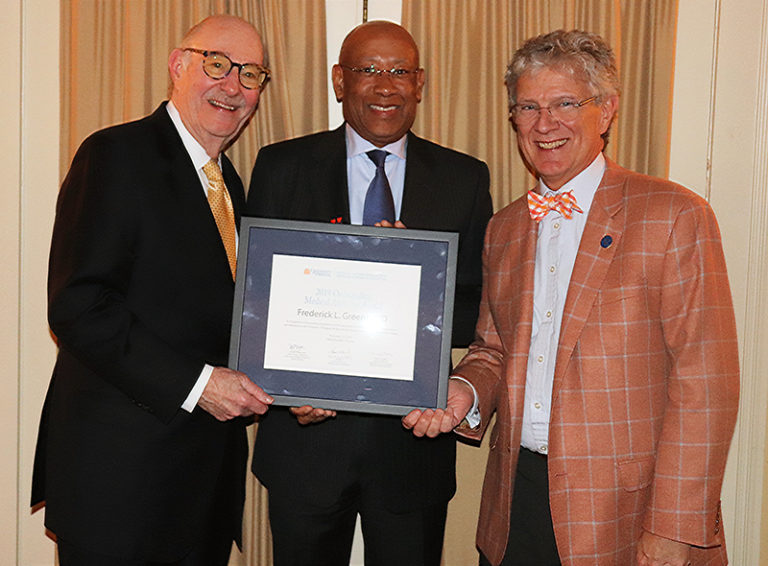Building a Legacy of Service: Dr. Frederick Leslie “Rick” Greene’s Journey
Dr. Frederick Leslie “Rick” Greene’s career isn’t simply a collection of accomplishments; it’s more a solidly constructed building where each brick represents a vital piece of his life’s work. His surgical expertise, military service, and unwavering dedication to improving cancer care and education have all served as the foundation upon which he’s built a remarkable legacy. At the core of this structure lie the values championed by the Algernon Sydney Sullivan Award, a prestigious honor he received from the University of Virginia. This recognition, bestowed upon those who embody noble character and a commitment to service, foreshadowed a career not only marked by medical advancements, but also by a profound dedication to helping others.
“I went to college and medical school at the University of Virginia and received the Sullivan Award in 1970 at graduation,” Greene explained. Like many Sullivan Award recipients, this recognition at the outset of his career may have been a catalyst for a lifelong pursuit of service.
From Naval Surgeon to Surgical Oncologist – Lessons Learned Aboard the USS Nimitz Shape a Profound Career Path
Greene’s path to becoming a distinguished surgical oncologist wasn’t a straight line. What most might describe as an invaluable learning experience, occurred during his time aboard the USS Nimitz. There, as the sole surgeon for a crew of 6,000, Greene faced a unique challenge. Unlike a well-equipped hospital, the Nimitz offered limited resources and specialist support.
“The day I stopped my residency was July 1, 1976,” Greene recalled. “A week and a half later, I was in the Mediterranean on this nuclear carrier.” This transition from resident to primary medical provider on a nuclear aircraft carrier created a demanding environment. Resourcefulness and adaptability became essential. “There were times,” Greene explained, “where you had to make do with what you had and improvise on the spot.” Certainly, these challenging circumstances honed his decision-making skills.
Beyond the Operating Room – Innovative Education and Knowledge Dissemination in Cancer Care
Greene established himself as a leader in surgical oncology before turning his passion towards medical education. As the medical director of Cancer Data Services at the Levine Cancer Institute, he played a key role in using data to improve patient care. His leadership led to the integration of data-driven insights into treatment protocols, ultimately resulting in better outcomes and advancements in oncology practices.
In an effort to reach a wider audience, Greene transitioned to educational communication. He leveraged the use of digital media and lauched podcasts like “The Recovery Room” and “Speaking of SurgOnc,” to share critical information about cancer care. This shift in focus extended the reach of his expertise beyond that of the clinic or research lab.
It would seem that this move into education reflected a broader commitment to fighting cancer. Green wasn’t just dedicated to treating a disease; he began empowering the medical community and consumers with knowledge and fostering a better understanding of cancer care.
From Radio DJ to Medical Communicator: A Lifelong Passion for Sharing Knowledge
Greene’s journey to becoming a leading communicator in the medical field wasn’t a direct path. The necessary skillset to relay information to an audience was honed surprisingly early. At 15 years of age, Greene found himself behind the microphone working for a local radio show. This experience sparked a lifelong interest in the power of communication. “I was sort of the disc jockey,” Greene said. “So, I guess communication has always been interesting for me.”
As Greene’s career progressed, his interest in communication also continued. As technology evolved, he recognized how it might be leveraged to relay and better explain complex medical information. Through these “new media” channels, Greene translates complex medical concepts into clear and engaging language, catering not only to healthcare professionals seeking updates on advancements, but also to the general public.
Community Building in Medical Education – The Mulholland Society and Dr. Greene’s Commitment to Student Support
Greene’s commitment to the medical community extends beyond his clinical and research contributions; it is deeply rooted in fostering a supportive and collaborative environment for medical students. This commitment is epitomized by his foundational work with the Mulholland Society at the University of Virginia, an organization dedicated to enhancing the educational experience and support for medical students. Named after a revered professor, the Mulholland Society represents Dr. Greene’s vision for a community where students can thrive academically, professionally, and personally.
Reflecting on the establishment of the Mulholland Society, Greene explained the importance of student engagement and leadership within the medical school ecosystem. “The reason I think I received the Sullivan Award is I founded the student organization for the medical school. Every student at UVA and in the medical school is a member of the Mulholland Society,” he explained. This initiative not only created a platform for student representation and voice but also laid the groundwork for a more cohesive and supportive medical student community.
Greene’s influence and leadership have also been recognized within professional organizations, notably the Commission on Cancer of the American College of Surgeons. Here, his roles have spanned from a quality site reviewer to holding senior leadership positions where he has been instrumental in shaping policies and practices to improve cancer care. His colleagues attest to his broad impact, noting, “Not only has he served as a top-quality site reviewer and contributor…but he also has held most, if not all, the top leadership positions within the organization.” This endorsement by his peers reflects the collective admiration and respect Dr. Greene has earned for his contributions to the field and his dedication to mentoring the next generation of medical professionals.
A Full-Circle – Embodying the Sullivan Award’s Ideals
Greene’s reflections on his career and the role of the Sullivan Award encapsulate a philosophy that has guided his professional journey. “I’ve always been proud of being a Sullivan Award winner, but I’ve never really understood the workings of the Sullivan Award…I think it’s another opportunity for me to give back because of what the Sullivan Award and the Foundation gave to me.” This sentiment illustrates a full-circle moment, recognizing the award not just as an honor, but as spark for igniting a lifetime of service and contribution.
In Dr. Greene’s career, we can easily recognize the embodiment of the Sullivan Award’s ideals—a combination of excellence, service, and leadership. His journey from a young award recipient to a distinguished figure in surgical oncology and medical education underscores the profound impact that a dedication to service can have on one’s career and on the lives of countless others.
Back to all News items.


